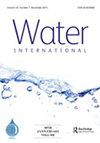社区水资源管理中的性别和社会包容:来自喜马拉雅山麓两个地区和尼泊尔德莱地区的经验教训
IF 1.5
4区 环境科学与生态学
Q3 ENGINEERING, CIVIL
引用次数: 1
摘要
摘要尽管尼泊尔几十年来一直致力于解决这一问题,但农村供水部门仍然存在性别和社会排斥问题。这项研究提供了来自两个地理和社会不同背景下的社区用水群体的见解,以从性别和社会包容的角度,并通过机构拼凑,更好地理解一些用水群体如何适应当地环境,形成不同的群体动态,而这些动态并不总是公平的。调查结果显示,在与社区管理供水系统相关的复杂社会和经济因素网络中,促进社会包容的政策很难实施。本文章由计算机程序翻译,如有差异,请以英文原文为准。
Gender and social inclusion in community water resource management: lessons from two districts in the Himalayan foothills and the Terai in Nepal
ABSTRACT Despite decades of concerted efforts to address the problem, Nepal’s rural water supply sector continues to be laced with gender and social exclusion. This study provides insights from community water-user groups in two geographically and socially diverse contexts to better understand, from a gender and social inclusion perspective, and through institutional bricolage, how some water-user groups adapt to local contexts, shaping varied group dynamics that are not always equitable. Findings reveal that policies promoting social inclusion are difficult to implement amid the complex web of social and economic factors associated with community-managed water supply systems.
求助全文
通过发布文献求助,成功后即可免费获取论文全文。
去求助
来源期刊

Water International
工程技术-工程:土木
CiteScore
4.40
自引率
7.70%
发文量
58
审稿时长
6-12 weeks
期刊介绍:
Water International is the official journal of the International Water Resources Association (IWRA), founded in 1972 to serve as an international gateway to the people, ideas and networks that are critical to the sustainable management of water resources around the world. Water International''s articles, state-of-the-art reviews, technical notes and other matter are policy-relevant and aimed at communicating in-depth knowledge to a multidisciplinary and international community. Water International publishes both individual contributions and thematic special issues and sections on cutting edge issues.
All individual manuscript submissions are subject to initial appraisal and peer review by the Deputy Editor in Chief and the Associate Editors, and, if found suitable for further consideration, to peer review by at least one independent, anonymous expert referee. All external peer review is double blind. Thematic issues and sections are handled under comparable procedures by guest editors under the oversight of the Editor in Chief.
 求助内容:
求助内容: 应助结果提醒方式:
应助结果提醒方式:


